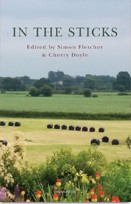REVIEW: ‘IN THE STICKS’ ANTHOLOGY
Reviewed by Stella Backhouse

Confession time: during lockdown, when a more-than-once-daily dose of news got too depressing, I started watching twee property show Escape to the Country instead. There was much to enjoy. I could snoop around other people’s houses. I could roll my eyes at smug, entitled Boomers casually trotting out the dream-retirement formula of ‘character property in village location with big kitchen-diner and one-to-two of acres of land’. This season though, with the work-from-home revolution opening rural living to working-age people, EttC has suddenly morphed from backwater to zeitgeist. The market is cut throat! Prices are turbo-charged! Gazumping is back! Welcome – in other words – to the great post-lockdown rural property bonanza.
Worship of country lifestyles seems a definingly English trait – and some of this must be attributed to the success of English poetry. From Shakespeare to Wordsworth, John Clare, Hardy, Housman, Ted Hughes and onwards, English poets have taught us how to love the English countryside, and in the process, have put it at the heart of English identity. So what does In the Sticks, a new anthology of countryside-inspired poetry from Offa’s Press (ed. Simon Fletcher and Cherry Doyle), have to tell us about our current relationship with what many of us think of as our best, most sacred self?
There are various ways of answering this. One thing that’s noticeable is that over half the contributions are written in the first person, again attesting to the power of deeply-felt responses to nature to affirm us as individuals and tell us who we are. As you’d hope, you’ll find some gorgeous, evocative nature poems within these pages, including ‘The Blossom Forecast’ by Simon Fletcher, ‘Pheasant’ by Cherry Doyle, ‘I Lied’ by Santosh K Dary and ‘River’ by Kuli Kohli.
On the other hand, when immersion in nature does not bring the expected comfort, frustration is exacerbated. Tom Allsopp’s extraordinary villanelle ‘Peace Eluded’ conveyed a sense of claustrophobia, dizziness and disorientation that still has not completely left me. In several poems, discomfort is introduced via the agency of the gun – life-destroying and used repeatedly to symbolise the alienation of those who see nature as existing only for human gratification. In Rosina Trotman’s ‘Shattered’, the shooting party emerges “Bragging of the clever shots… And how the woodcock’s lolling head/Would be envied in the Crown”.
Perhaps one reason why poetry and countryside seem to fit each other so perfectly is that the countryside is where we experience most vividly that quintessentially poetic phenomenon, the passage of time. This is acknowledged by the structure of In the Sticks, which is divided into four sections corresponding to the four seasons. But there is also a more problematic reality – one frequently euphemised on Escape to the Country as the desire for “community” or “a slower pace of life”. They say ‘Escape to the Country’; they mean ‘Escape to the Idealised Past’.
Thankfully, many of these poets effectively debunk such cosy aspirations. Peter Branson reminds us that for much of recorded history, the story of the countryside has been the story of massive inequalities; Nick Pearson, that the past of many apparently rural locations is actually one of heavy industry. Jack Bigglestone, the anthology’s only openly queer contributor, cleverly combines respect for age-old farming wisdom with subtle hints that queer was always present; John Sewell portrays the repurposing of a historic building as the spoliation of the planet in microcosm.
One preconception however is less successfully addressed; and that is that the countryside – and by extension true Englishness – is white. Don’t blame the editors; they have clearly tried to reach out. But contributors to anthologies are largely self-selecting, and the fact that the vast majority of poets who felt this was a project for them are (if their names are anything to go by) white British suggests that this inner sanctum of English identity, the countryside, is still seen by writers of colour as off-limits.
This in no way detracts from the poets who have helped create this delectable anthology. It’s a systemic problem that won’t be solved until writers of colour feel sufficiently confident of their place in the countryside to start speaking about it. I say bring it on. Or – to quote Neil Leadbeater’s poem ‘Winter-pruning the Pear Trees’: “We needed new blood,/something that would knock sense into the bark”.
In the Sticks can be purchased online from Offa’s Press.
